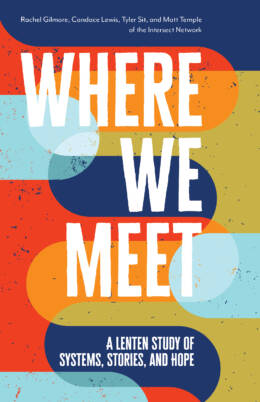Today’s Reflection
Repentance begins by centering the stories of people on the margins. Holy work always starts with listening, but it never stops there. It entails believing that experiences different from our own are equally valid. Stories awaken our awareness and invite us to acknowledge the impact of historical injustices, harm, and oppression. This allows us to take responsibility for the barriers these actions have created for some and the advantages that they’ve provided to others. Repentance requires us to remain open-minded, humble, and alert to the unjust systems that are at play. It means that when we uncover areas of ignorance or indifference, we take action to correct them.
—Matt Temple, “Postcolonial,” in Where We Meet: A Lenten Study of Systems, Stories, and Hope (Upper Room Books, 2023)
Today’s Question
Where can you go to hear the stories of people who have been wounded by the church? How can you prepare yourself to listen to stories from people on the margins? Join the conversation.
Today’s Scripture
[Jesus] came to a Samaritan city called Sychar, which was near the land Jacob had given to his son Joseph. Jacob’s well was there. Jesus was tired from his journey, so he sat down at the well. It was about noon. A Samaritan woman came to the well to draw water. Jesus said to her, “Give me some water to drink.” His disciples had gone into the city to buy him some food. The Samaritan woman asked, “Why do you, a Jewish man, ask for something to drink from me, a Samaritan woman?” (Jews and Samaritans didn’t associate with each other.)
—John 4:5-9 (CEB)
Prayer for the Week
Breath Prayer
Inhale: Jesus, Son of God
Exhale: Have mercy on me, a sinner.
Inhale: Ever-present God
Exhale: May I feel you here.
Inhale: You know me.
Exhale: You love me.
Inhale: You know my neighbors.
Exhale: You love my neighbors.
Inhale: You see me.
Exhale: You see the unseen.
Inhale: Help me to see
Exhale: All your children.
Inhale: God of love
Exhale: May all know your love.
—Prayer by Rachel Gilmore in Where We Meet
Submit your prayer to The Upper Room.
Something More
What is Lent? When is Lent? Why do we set it apart? Learn more about this special season by reading Lent 101.
Lectionary Readings
(Courtesy of Vanderbilt Divinity Library)
Looking for lectionary-based resources? Learn more about The Upper Room Disciplines.




4 Comments
I am able to go to my own church – my own denomination, The Episcopal Church in the United States (formally called The Episcopal Church, or TEC) – to encounter people who have been elsewhere wounded by the church. The Episcopal Church is a refuge for many people who have had painful experiences with Christianity previously in their lives on both ends of the Catholic-to-Protestant spectrum. I have had deep conversations with former Evangelicals and former members of Catholic churches who have suffered sometimes grave mistreatment at the hands of members and clergy in their former denominations. This is not to say that The Episcopal Church is somehow perfect . . . It is not – and no church is. But many Episcopal parishes espouse the Via Media (middle way, between Catholicism and Protestantism), emphasize peace and social justice as central tenets of their teachings, and embody values of diversity and inclusion, all using a liturgical form of worship guided by the Bible and facilitated by the Book of Common Prayer (a collective worship prayer book that has its roots in the 1500s and is thoroughly infused with the Biblical language and principles). I became an Episcopalian because my wife’s family was Episcopalian. I remain one because the Episcopal Church provides a home for me that aligns with my values and has absolutely has prepared me to listen to stories from people on the margins.
Even as a young person, I encountered people who were wounded in the church. As a seminary student, I was friends with several women who hadn’t experienced abuse at church and institutions of the church. I myself experienced church hurt and hurt that took place at church run institutions. In the recent peer specialist training i did, I met several persons who had experience church and religious trauma. Probably any place people gather, one would find those who have experienced this wounding. It goes deep and impacts the way they view Jesus. To listen to their stories, be prepared to hear things that are difficult to hear. Listen actively and try not to respond with religious talk. Hear them. Sit with them. Love them. Offer What support you can. You may encounter someone who is so traumatized, that they are not in a place to receive hearing about Jesus, who can offer healing, but not push Himself on the wounded. Treat them with respect.
Julie, praying as you care for H. Jill, praying your furnace is fixed and you have heat. Rusty, I have friends in the Episcopal Church who are there because they found the things you mentioned, and have been able to move forward in faith due to the healing and acceptance they have experienced there. A beautiful thing.
I would surely like to hear from Robert. I pray he is ok. Love to all.
I noticed that autocorrect changed “had experienced” to “hadn’t experienced”. It is “had experienced” abuse in the church.
Go to any church, where all people present are sinners in dire need of a Saviour, and one will find wounded souls. What churches need to work on is presenting environments where there is safety in being open and honest. Forgiveness and accountability must also be sure tenets.
So far, my furnace seems to be working as normal. Grateful for this. Got some car maintenance done today, a friend stopped by for a visit and I took a walk in the sunshine. Snow moving in this evening and tomorrow is supposed to be pretty cold. Did quite a bit of grading today, still more to do. Trying to catch up from being away.
Looking forward to seeing my best friend tomorrow, as my god son has a game. The team is 18-2. What a fun season it has been, with more to come hopefully.
Add Comment